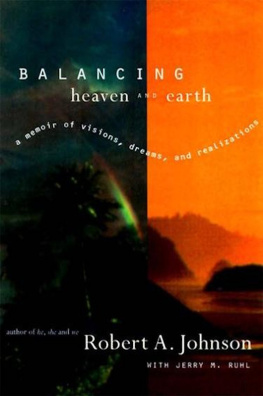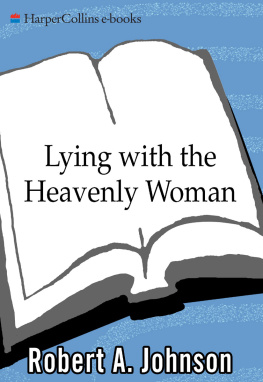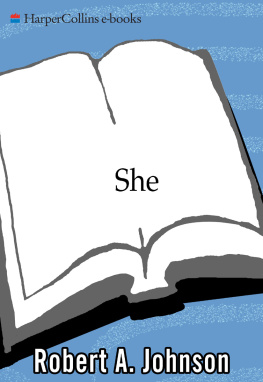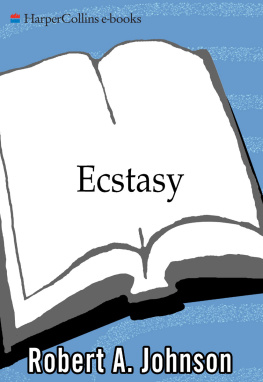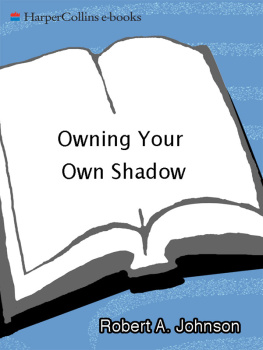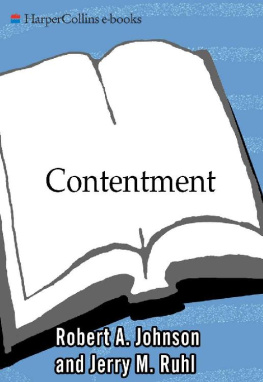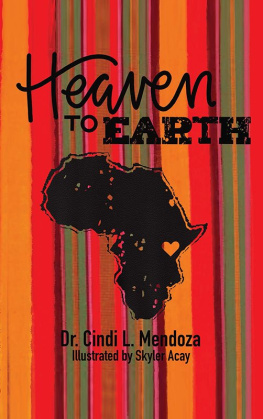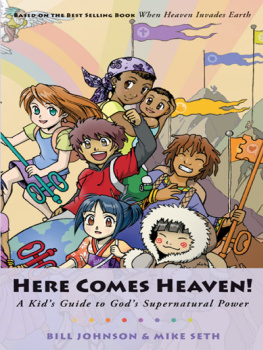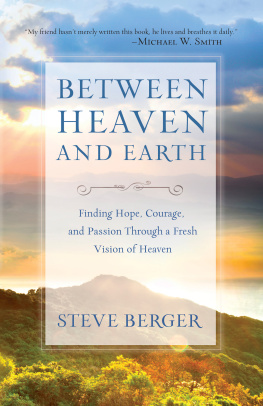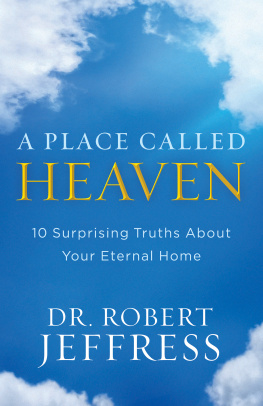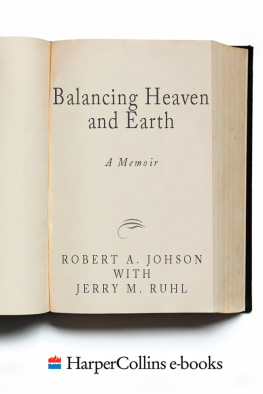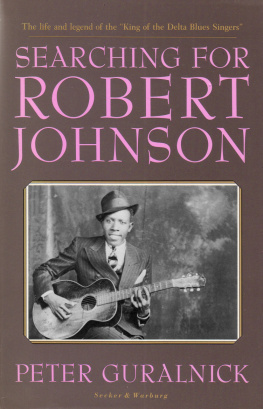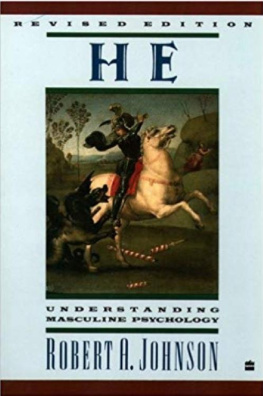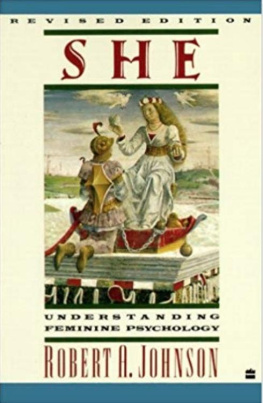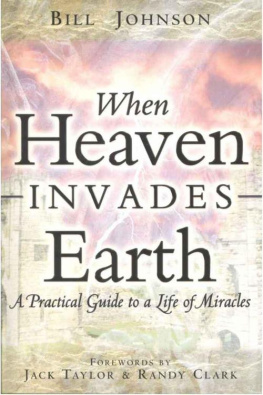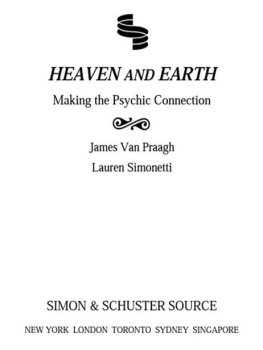Robert A. Johnson - Balancing Heaven and Earth
Here you can read online Robert A. Johnson - Balancing Heaven and Earth full text of the book (entire story) in english for free. Download pdf and epub, get meaning, cover and reviews about this ebook. year: 2009, publisher: Harper Collins, genre: Non-fiction. Description of the work, (preface) as well as reviews are available. Best literature library LitArk.com created for fans of good reading and offers a wide selection of genres:
Romance novel
Science fiction
Adventure
Detective
Science
History
Home and family
Prose
Art
Politics
Computer
Non-fiction
Religion
Business
Children
Humor
Choose a favorite category and find really read worthwhile books. Enjoy immersion in the world of imagination, feel the emotions of the characters or learn something new for yourself, make an fascinating discovery.
- Book:Balancing Heaven and Earth
- Author:
- Publisher:Harper Collins
- Genre:
- Year:2009
- Rating:5 / 5
- Favourites:Add to favourites
- Your mark:
- 100
- 1
- 2
- 3
- 4
- 5
Balancing Heaven and Earth: summary, description and annotation
We offer to read an annotation, description, summary or preface (depends on what the author of the book "Balancing Heaven and Earth" wrote himself). If you haven't found the necessary information about the book — write in the comments, we will try to find it.
Balancing Heaven and Earth — read online for free the complete book (whole text) full work
Below is the text of the book, divided by pages. System saving the place of the last page read, allows you to conveniently read the book "Balancing Heaven and Earth" online for free, without having to search again every time where you left off. Put a bookmark, and you can go to the page where you finished reading at any time.
Font size:
Interval:
Bookmark:
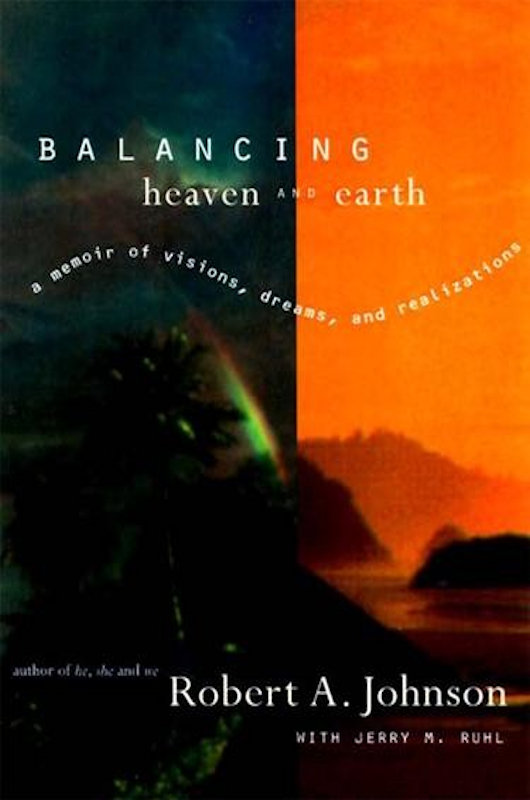

This book is dedicated to the many godparents who made life possible for me as I went from one stage to another of my life.
Robert A. Johnson
T his book is about the evolution of consciousness as told through one remarkable life. Robert A. Johnson has always lived close to the collective unconscious, which has been both his curse and his blessing. His story is principally an inner journey guided by powerful dreams, visions, and synchronistic events. Others have written about such things, but it is rare to find someone who maintains an ethical obligation to these powerful and mysterious forces. What is most remarkable to me is Roberts example of how to live with a religious attitude in postmodern times.
By religious attitude I am not referring to following a path toward redemption or salvation or even necessarily to being a member of a religious institution. A religious attitude relates to the cultivation of soulan openness to wonder, awe, fear, and reverence with respect to the other, those numinous forces that exist outside our conscious control. These powers have been called at various times fate, destiny, the hand of God, or, to use Roberts term, the slender threads.
Roberts life is truly guided by slender threads. While most modern people are preoccupied with getting and spending, constantly fretting and struggling to manipulate external reality so that it goes their way, his process follows a different flow. He waits and watches for the slender threads, listens attentively, dialogues with the unconscious, and acts only when a larger pattern has been revealed.
Roberts life story is not lacking in drama, adventure, and humor; he has crossed paths with a fascinating cast of characters that includes Carl Jung, Jiddu Krishnamurti, and an assortment of sages, saints, and sinners. In countless ways his experiences have anticipated the collective concerns of Western societystruggles with loneliness and alienation, a yearning for community, the search for values and personal meaning in a secular culture, the encounter between Eastern and Western philosophies, hunger to connect with something more enduring and of greater circumference than our individual egos.
But like his mentor, Carl Jung, Robert looks upon the outer aspects of his life as incidental, while inner processes have provided the substance and determining value.
I first met Robert nearly a decade ago at a Jungian conference in Colorado. I was already fascinated by the works of Carl Jung and Joseph Campbell and was contemplating leaving an executive position in corporate America to pursue my real passion. Arriving at the conference early, I walked into a reception room and spied Robert sitting shyly in a corner by himself. I recognized him immediately from the photo on his book jackets. Uncharacteristically (for an introvert), I marched up to introduce myself and welcome him. I felt absolute joy that morning. It was one of those all-too-rare instances when one is totally absorbed in Presence, not yearning to be somewhere else, with anyone else, or doing anything else at all. Robert, with his keen sense of feeling, must have picked up on my happiness (he would later tell me that one of the finest acts of devotion to God is simply to be happy), as he asked if we could share lunch. That day, over a picnic in the park, I experienced a true mentor, someone who seemed not only to read my thoughts but also to care about my soul. Our conversation fortified my resolve to leave a career that I had outgrown, and it also planted a seed in mea seed of belief that I had something of enduring value in my inner life. Robert made me feel valued, and I know he has that effect on many people.
We corresponded for several months before I took Robert up on his offer to visit his quiet home overlooking a beach in southern California. Words do not capture the experience of simply being with Robert, a calm and gentle man who speaks in conversation with the same flowing, musical quality that makes his lectures so magical. His presence brings a peacefulness and a sense of organic order, like being dropped down into a tranquil Japanese garden in which human creation and the matrix of nature are in harmony.
Over the next several years I indulged in his hospitality during many visits, while also completing a Ph.D. in depth psychology with Roberts encouragement. During this time I listened to hundreds of hours of tapes from Roberts private collection, and time and time again I felt a shock of insight in response to some religious commentary or psychological gem contained in one of Roberts lectures.
In 1995 I learned that Robert had chosen to stop writing, a decision that characteristically was made following a dream. In the dream he had sat down at his desk, only to discover that the fountain pen he was using no longer contained ink but was filled only with water. Despite the encouragement of friends, colleagues, and his publisher, Robert was convinced that the writing stage of his life was over.
A few months later, gazing out at the Pacific and welcoming a new day with the customary Johnson breakfast of fresh carrot juice, I proposed to Robert an idea. Most of his books, starting with the perennial best-seller, He , had taken readers on spiritual and psychological journeys by way of myths or folktalesthe Parsifal legend, the story of Tristan and Isolde, the myth of Dionysus. Yet what about the myth of Robert Johnson? His life itself, I suggested, was the best example of how to find balance and healing in turbulent times. In his seventy-fifth year he could look back on that life with perspective and recognize the slender threads at work. If he would allow me to tape a series of conversations, I would provide the bulk of the writing, and together we might develop a different sort of book, not strictly a biography or even an autobiography, but a story of the unfolding of consciousness within one individual. Dr. Jung had produced such a work in his Memories, Dreams, Reflections , but that was a different life in a different era.
Robert heard me out and said he would have to sit with the idea. A few hours later he emerged from his office with a tiny hand-held tape recorder. It was settled, and our interviews began that day. Over the next several months many hours were spent in conversation, first reviewing Roberts life and later amplifying key themes and issues that readers might find helpful for their own development. In the creation of this book I also drew upon Roberts journals and numerous unpublished lectures, which previously have been available only to a lucky few. While reviewing the manuscript, Robert made many helpful suggestions and, I am delighted to say, even took laptop computer in hand and began writing again.
When Roberts first book was published in 1974, the general public was just beginning to rediscover the power and timeless wisdom of myths and folktales. He was one of the first to present Dr. Jungs rich but complex theories with simple elegance and grace. Anyone who has delved into the twenty volumes of Jungs collected works knows that simple is not easy; it requires an in-depth understanding to make such psychological theory digestible.
For a time, Robert was fond of telling a self-effacing story about being elevated to near sainthood in a small Indian village based upon the villagers observation that he did not eat very much, say very much, or do very much. He joked that these were his primary credentials for addressing the religious life. Of course, what those intuitive villagers in India perceived in Robert went much deeper. Their understanding went to the very heart of the matter. Roberts example has had lasting influence on my own writing, my therapeutic approach, and my daily life. It is my hope that this book will extend that experience to many others.
Font size:
Interval:
Bookmark:
Similar books «Balancing Heaven and Earth»
Look at similar books to Balancing Heaven and Earth. We have selected literature similar in name and meaning in the hope of providing readers with more options to find new, interesting, not yet read works.
Discussion, reviews of the book Balancing Heaven and Earth and just readers' own opinions. Leave your comments, write what you think about the work, its meaning or the main characters. Specify what exactly you liked and what you didn't like, and why you think so.

